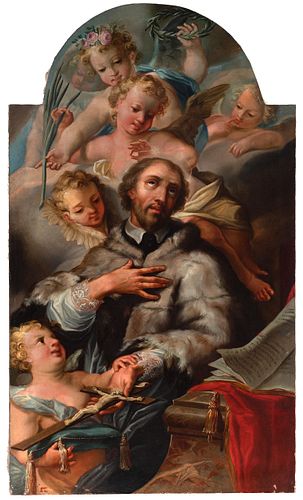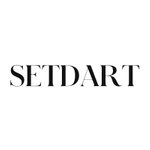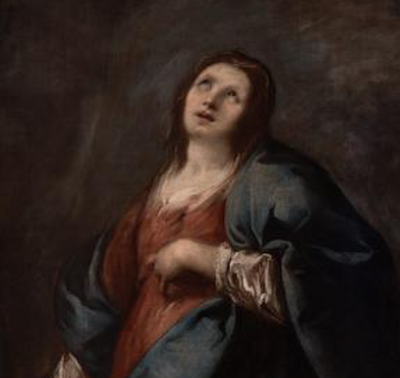Neapolitan school, ca. 1760. "San Juan Nepomuceno crowned". Oil on canvas.
Lot 78
About Seller
Setdart Auction House
Carrer Aragó 346
Barcelona
Spain
Setdart Subastas was born in 2004 and is currently the first online art auction in Spain with solidity, prestige and reliability guaranteed by our more than 60,000 users. Setdart has a young, dynamic and enterprising team ready to successfully manage the purchase and sale of art works through custom...Read more
Estimate:
EUR€5,000 - EUR€5,500
$5,319.15 - $5,851.06
Absentee vs Live bid
Two ways to bid:
- Leave a max absentee bid and the platform will bid on your behalf up to your maximum bid during the live auction.
- Bid live during the auction and your bids will be submitted real-time to the auctioneer.
Bid Increments
| Price | Bid Increment |
|---|---|
| EUR€0 | EUR€10 |
| EUR€200 | EUR€25 |
| EUR€500 | EUR€50 |
| EUR€1,000 | EUR€100 |
| EUR€3,000 | EUR€200 |
| EUR€5,000 | EUR€500 |
| EUR€10,000 | EUR€1,000 |
| EUR€20,000 | EUR€2,000 |
| EUR€50,000 | EUR€5,000 |
About Auction
By Setdart Auction House
May 31, 2021
Set Reminder
2021-05-31 08:30:00
2021-05-31 08:30:00
America/New_York
Bidsquare
Bidsquare : OLD MASTERS - Day 1
https://www.bidsquare.com/auctions/setdart-auction-house/old-masters---day-1-6998
Setdart Auction House sofia@setdart.com
Setdart Auction House sofia@setdart.com
- Lot Description
Neapolitan school, ca. 1760. "San Juan Nepomuceno crowned". Oil on canvas. Measurements: 152 x 87 cm. The present work, framed in the Neapolitan school and dated around 1760, shows St. John of Nepomuk as the main protagonist. A saint of Czech origin, he acquired great devotion and popularity in the 17th century. John of Nepomuk (ca. 1340-1393) is the patron saint of Bohemia and of the Spanish Marines. Alleged confessor of Sophia of Bavaria, he incurred the wrath of King Wenceslas IV by refusing to break the secret of confession, for which he was killed by being thrown into the Vltava River from the Charles Bridge in Prague. He is presented centered in the composition, surrounded by angels that give the work a dynamic character. We see that in his left hand he carries a crucifix, connecting with one of his companions, another holds the palm (an attribute common to all martyrs). He is wearing the ermine cloak, which in turn indicates the choice of martyrdom rather than impurity. The distinctive sign of the Neapolitan school has always been its strong naturalistic character, its warm color, with reddish and chestnut dominants and the cultivation, together with the altar painting, of a type of realistic painting its best exponent. In Naples the influence of José Ribera was equal or superior to that of Caravaggio. His naturalism, more sensual and material, more vigorous and vehement, less intellectual than that of the latter, becomes permeable over time to Venetian and Flemish influences, becoming richer in color and lighter in technique, especially from 1635. His most faithful disciples are the Fracanzano family, Cesare (1600-51) and Francesco (1612-56), Bartolomeo Bassante (1614-56), Paolo Domenico Finoglia (1590-1645) and some others who later cultivated special genres such as Aniello Falcone (1607-56), Salvatore Rosa (1615-73) or Luca Giordano. However, from the Baroque period onwards, the colors became softer and more nuanced, without opting for tenebrism, but preserving a great theatricality in the representations.
- Shipping Info
-
In-house shipping available. Please inquire at admin@setdart.com.
-
- Buyer's Premium



 EUR
EUR CAD
CAD AUD
AUD GBP
GBP MXN
MXN HKD
HKD CNY
CNY MYR
MYR SEK
SEK SGD
SGD CHF
CHF THB
THB















